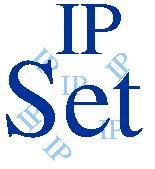|
IP set features
Set types
IP sets support the following type of sets:
- bitmap:ip
The bitmap:ip set type uses a memory range, where each bit
represents one IP address and can store up to 65535 (B-class network)
entries. You can store same size network addresses in this kind of sets as well
and an IP address will be in the set if the network address it belongs
to can be found in the set.
- bitmap:ip,mac
The bitmap:ip,mac set type uses a memory range, where each 8 bytes represents
one IP and a MAC addresses. A bitmap:ip,mac set type can store up to 65535
(B-class network) IP addresses with MAC.
- bitmap:port
The bitmap:port set type uses a memory range, where each bit represents
one TCP/UDP port. A bitmap:port type of set can store up to 65535 ports.
- hash:ip
The hash:ip set type uses a hash to store IP addresses where clashing
is resolved by storing the clashing elements in an array and, as a last resort, by dynamically
growing the hash. Same size network addresses can be stored in an hash:ip
type of set as well.
- hash:net
The hash:net set type also uses a hash to store CIDR netblocks, which
may be of different sizes. The same techique is used to avoid clashes
as at the hash:ip set type.
- hash:ip,port
The hash:ip,port is similar to hash:ip but you can store IP address
and protocol-port pairs in it. TCP, SCTP, UDP, UDPLITE, ICMP and ICMPv6
are supported with port numbers/ICMP(v6) types and other protocol
numbers without port information.
- hash:ip,port,ip
You can store IP address,
port number, and IP address triples in an hash:ip,port,ip type of set.
- hash:ip,port,net
You can store IP address, port number and network address triples
in this kind of set.
- hash:net,port
The set type supports to store network address and port number pairs.
- hash:net,iface
In this kind of set one can store network address and interface name
pairs.
- list:set
In a list:set kind of set you can store other sets; it is like
an ordered union of different sets.
set match and SET target of iptables
IP sets can be used via the set match and
SET target in iptables rules.
In the arguments of
the extensions, the tokens src and dst can be used to
specify which IP address or port to use from the packet to match the
given set.
|
|
